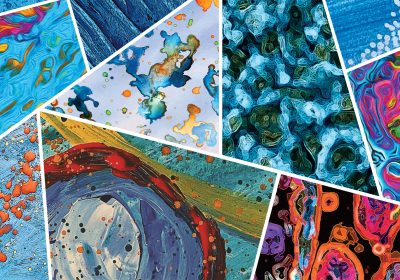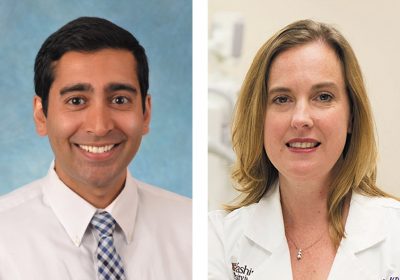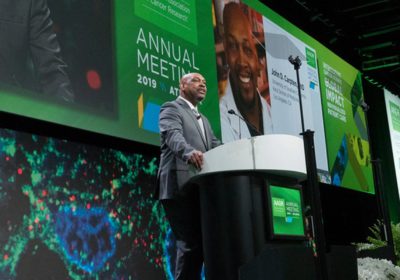Dr. Michael A. Caligiuri: Tackling Cancer’s Toughest Problems
For Michael A. Caligiuri, MD, the 2017-2018 AACR President, it is unacceptable that advances in cancer care and treatment don’t benefit everyone equally. Dr. Caligiuri, president and physician-in-chief of City of Hope National Medical Center in Duarte, California, doesn’t think race, income, place of residence, or health insurance should determine access to the latest cancer treatments.
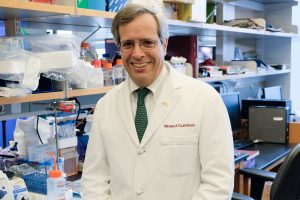
Photo © AACR/Josh Goldstein 2017
Dr. Caligiuri has made cancer health disparities one of the signature issues of his tenure as AACR President.
“I personally think the biggest travesty right now in cancer care is in the disparities that exist in outcomes for people of different races, socioeconomic groups, and geographic locations,” Dr. Caligiuri said. “This difference is profound. It shouldn’t be a curse to be born into an underrepresented group or to face socioeconomic or geographic barriers to accessing quality cancer care. But in this country, it is.
“So, while the science is taking off at light-breaking speeds, the fact of the matter is we can’t deliver cancer care equally across our country,” he added. “We need a multipronged strategy to address this, and I’m delighted that the AACR is taking a big and important role in doing this.”
Making Tumor Sequencing More Available
One of the goals of his presidency has been to formulate a plan to make tumor sequencing—a necessity for precision cancer treatments and immunotherapy—more available to underserved patients.
“The good news is that the cost of sequencing tumors in patients with cancer is plummeting; the bad news is that the cost is not always covered by the third-party payors,” he said. “If you have a racial, ethnic, socioeconomic, or geographic disadvantage, you are not very likely to have your tumor and normal tissues DNA-sequenced to determine if you are eligible for targeted therapy or immunotherapy.”
Many such patients are likely to be treated with standard therapy like chemotherapy, he said, when an immunotherapy or a targeted therapy could be more effective and less toxic. Further, those patients are then excluded from the sequence databases that researchers are using to find new biomarkers and new mutations for targeted interventions.
“I want to take advantage of the AACR’s strength in basic and translational research and develop a partnership across our organization and other organizations to put the infrastructure in place for DNA-sequencing of normal and cancer tissue in an underserved population that likely has a different genetic makeup,” Dr. Caligiuri said. “We will then get that information entered into public databases so scientists can determine if specialized diagnostic or prognostic methods or different treatments are appropriate in the underserved population.”
An Impressive Research Record
Dr. Caligiuri is adept at finding solutions to difficult problems. A renowned physician-scientist, he is widely recognized for his research in immuno-oncology, leukemia, and lymphoma. He has designed and conducted many clinical trials for leukemia and lymphoma patients and has more than 400 original publications, abstracts, and review articles on immunology or leukemia.
Dr. Caligiuri believes the AACR is uniquely positioned to address some of the most pressing problems in cancer research and treatment. Among his goals as AACR President has been to expand the AACR’s efforts to improve cancer survival rates and to increase the number of cancers that are prevented in the U.S. and globally.
“The AACR is an amazing organization that stretches its arms around the world. We are the leading driver of basic science in cancer medicine, and we have the power to translate those discoveries into meaningful impact for cancer patients,” he said. “Through research and education, the AACR fights to reverse the current societal norms that accept cancer as unsolvable and unbeatable. We use our substantial organizational strength and influence to protect and nurture our youngest investigators and help our advocates to impact national policy and educate the world at large.”
Margaret Foti, PhD, MD (hc), chief executive officer of the AACR, calls Dr. Caligiuri a distinguished physician-scientist and a highly esteemed leader of the AACR and in the cancer field at large.
“Dr. Caligiuri’s dedication to accelerating the pace of discovery and its translation to the clinic has been invaluable to the AACR, and it is benefiting cancer patients worldwide,” she said.
Encouraging Public Support for Cancer Research
The public should be actively engaged in supporting cancer research, Dr. Caligiuri said, for two powerful reasons.
“The most compelling reason is that one out of every two men and one out of every three women in the U.S. will get cancer in their lifetime,” he said. “Second, cancer is costing our country hundreds of billions of dollars in treatment and lost wages—loss of work and loss of life—every year. It is a complete misconception that cancer research costs us money. Cancer costs us money. Cancer research saves us money.” He offered advice to those who want to support cancer research.
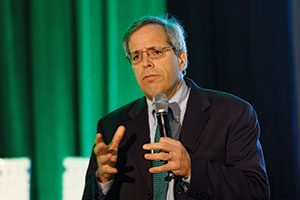
“First, speak to your congressional representatives and senators and let them know how cancer research is woefully underfunded. Tell them that only through funding will the necessary research be done to find and implement preventative strategies and the cures for cancer,” he said. “Cancer is in many instances preventable and will someday be eliminated. That ‘someday’ can be sooner rather than later—it’s a matter of having the funding to support the army of researchers that we need to get the job done.
“Second, make it a personal choice to reduce the likelihood that you will get cancer,” he added. “Exercise regularly, eat healthy, and undergo a routine physical exam, colonoscopy, mammography, and blood work for markers that are important for the early detection of cancer.
“Third, consider a personal commitment to support cancer research by volunteering or participating in fundraising events and by making a donation to support cancer research,” Dr. Caligiuri concluded.
Dr. Michael A. Caligiuri at a Glance
In addition to his service as AACR President 2017-2018, Dr. Michael A. Caligiuri has been actively involved with the AACR since 1990, serving on the Board of Directors from 2013 to 2016. Dr. Caligiuri has also chaired the Publications Committee, during which time the AACR launched three new journals: Cancer Prevention Research, Cancer Discovery, and Cancer Immunology Research. He has sat on the editorial boards of three of the AACR’s scientific publications and Cancer Today, the AACR’s magazine for cancer patients, survivors, and advocates. Dr. Caligiuri has served on numerous AACR award committees, including the AACR Margaret Foti Award for Leadership and Extraordinary Achievements in Cancer Research Committee; has chaired or been a member of multiple educational and conference committees; and has served as a faculty member for the AACR’s Scientist↔Survivor Program.
In addition to providing leadership at the AACR, Dr. Caligiuri has served as president of the Society for Natural Immunity and president of the Association of American Cancer Institutes. He chaired the National Cancer Policy Forum at the National Academy of Medicine. Dr. Caligiuri also received the National Cancer Institute Director’s Service Award, a National Cancer Institute MERIT Award, and an Outstanding Investigator Award from the National Cancer Institute for his work in immunology and cancer.



